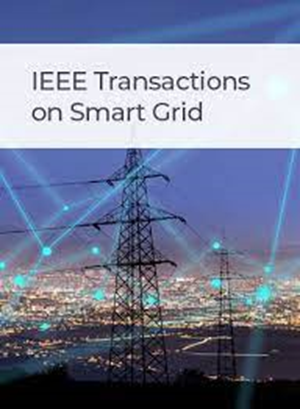基于压缩感知的配电系统状态估计中的在线不良数据检测
IF 9.8
1区 工程技术
Q1 ENGINEERING, ELECTRICAL & ELECTRONIC
引用次数: 0
摘要
本文介绍了一种在配电系统状态估计(DSSE)中在线检测不良数据的新方法,该方法将压缩感知(CS)与基于修正最大归一化残差(LNR)的检测器相结合。据作者所知,这是第一个专门为不可观察配电网络中基于cs的DSSE开发坏数据检测方法的工作。本文推导了压缩感知问题的封闭解,然后将其用于量化基于cs的DSSE估计中的误差统计量。这些统计数据使得基于特征分解的改进lnr检测器的设计成为可能,显著改善了异常检测。对IEEE 37总线和123总线不平衡配电系统的大量仿真表明,所提出的方法始终优于传统的LNR方法和基于神经网络的技术,即使在有限的测量次数下,也能以较低的计算量获得较高的检测率。这种强大的方法可以有效地从随机错误和网络攻击中检测数据异常,使其非常适合实际的DSSE应用。本文章由计算机程序翻译,如有差异,请以英文原文为准。
Online Bad Data Detection in Compressed Sensing-Based Distribution System State Estimation
This letter introduces a novel approach for online bad data detection in distribution system state estimation (DSSE) by integrating compressive sensing (CS) with a modified largest normalized residual (LNR)-based detector. To the best of the authors’ knowledge, this is the first work to develop a bad data detection method specifically for CS-based DSSE in unobservable distribution networks. The paper derives a closed-form solution for the compressed sensing problem, which is then used to quantify the error statistics in CS-based DSSE estimates. These statistics enable the design of a modified LNR-based detector using eigen decomposition, significantly improving anomaly detection. Extensive simulations on IEEE 37-bus and 123-bus unbalanced distribution systems demonstrate that the proposed method consistently outperforms the conventional LNR approach and neural network based technique, achieving superior detection rates with low computation effort even with a limited number of measurements. This robust approach effectively detects data anomalies from both random errors and cyber-attacks, making it highly suitable for practical DSSE applications.
求助全文
通过发布文献求助,成功后即可免费获取论文全文。
去求助
来源期刊

IEEE Transactions on Smart Grid
ENGINEERING, ELECTRICAL & ELECTRONIC-
CiteScore
22.10
自引率
9.40%
发文量
526
审稿时长
6 months
期刊介绍:
The IEEE Transactions on Smart Grid is a multidisciplinary journal that focuses on research and development in the field of smart grid technology. It covers various aspects of the smart grid, including energy networks, prosumers (consumers who also produce energy), electric transportation, distributed energy resources, and communications. The journal also addresses the integration of microgrids and active distribution networks with transmission systems. It publishes original research on smart grid theories and principles, including technologies and systems for demand response, Advance Metering Infrastructure, cyber-physical systems, multi-energy systems, transactive energy, data analytics, and electric vehicle integration. Additionally, the journal considers surveys of existing work on the smart grid that propose new perspectives on the history and future of intelligent and active grids.
 求助内容:
求助内容: 应助结果提醒方式:
应助结果提醒方式:


